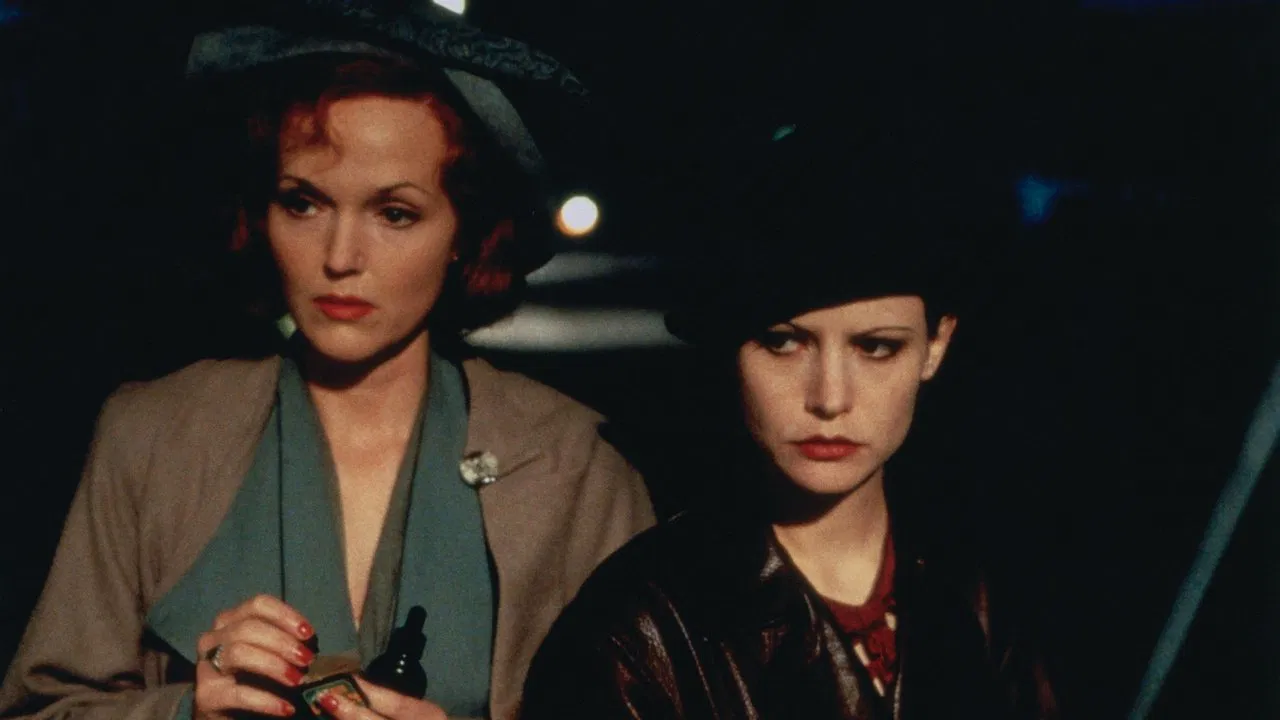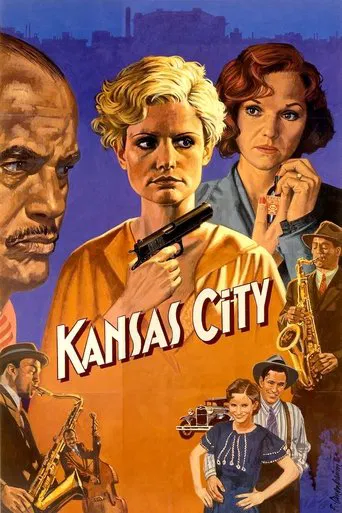

A kidnapping and a robbery move the plot forward in a film that's less about plot than about cultural ambiance. "Kansas City" is mostly a cinematic expression of place and time. It's 1934, when gangsters and jazz ruled and Blacks and Whites went their separate ways.Visuals are very dark. And though the film is in color, tints are muted, which conveys a nostalgic, sentimental mood. The thin plot takes place largely at night. And the plot alternates with dark interior scenes at the Hey Hey Club, a risqué, all-Black speakeasy where an all-Black band jives free-form jazz, and where illegal gambling fills the back rooms.None of the characters are sympathetic. But I don't think they're supposed to be. They're archetypes, models of desperate people in desperate times. A gun-wielding gangster's girl named Blondie (Jennifer Jason Leigh) wants to be like Jean Harlow. Mrs. Stilton (Miranda Richardson) is a wealthy, spaced-out politician's wife. Seldom Seen (based on a real-life person and played by Harry Belafonte) is the cigar smoking godfather who rules the dark, smoky Hey Hey Club with an iron fist and who likes to stand around giving lectures to people.The script's dialogue is mostly subtext, with message directed less at other characters than at viewers. And, as in other Altman films, then-current politics dance around the edges of the seedy story. The overall tone mixes depression with desperation.For me this is an easy film to judge. The characters and plot I cared for not at all. Jennifer Jason Leigh was painful to watch. And though the jazz is performed with great competence, its free-form, improvisational style is too contemporary to reflect the 1930s. On the other hand, Miranda Richardson gives a fine performance. Attention to detail in costumes, sets, props, and storefront exteriors make the film come alive with era realism. And lighting is absolutely terrific.If you go into this movie expecting a deep story and well-constructed plot, you'll be disappointed. Absorb the overall texture of the film's visuals. "Kansas City" is a terrific visual portrait of a specific place at a specific time.
... View MoreRobert Altman was born and raised in Kansas City. This film was, by his description, intended as a tribute to the music he remembers hearing while growing up. 1934 was the highpoint of the Pendergas Machine's political strength in Kansas City, and nothing shown in the movie is beyond reality.But, the music is the thing. I heard an interview with Altman before I saw the film, and it really helped me understand what was going on. Essentially, the whole thing is structured like a tune. There's an exposition of 2 separate themes (the Leigh/Richardson story and the Hey Hey Club); those themes are expanded, developed, torn up, put back together, and finally, combined. The plot of Leigh/Richardson's story is secondary to the music. Heck, the plot of Seldom Seen's story is secondary to the music. The performances are pretty good, even if they aren't all really true to the Kansas City style--but, check out "Indiana" for as close to the real thing as you'll hear anywhere outside of a Benny Moten collection. For pure musical heaven, the closing credits with "Solitude" (Ellington) is done with so much taste by Christian McBride and Ron Carter. Pure magic, especially on first viewing in a theater. Thank you, Mr Altman!
... View MoreThis movie does a good job of portraying a 1930s Kansas City of mobsters, racial unrest, petty criminals and jazz, and if all it took to make a good movie was atmosphere then this would be a great film. But all this movie has is atmosphere, and it's not enough. I'm not a big fan of Altman (I like about 1 out of every 15 of his movies) but I watch anything Jennifer Jason Leigh is in, so I had to watch it. Leigh is fine but this is not one of those electric performances that has made me such a fan. I don't think it's possible to bring any electricity to this lumbering creature. I was incredibly bored throughout and only kept watching out of a vague curiosity as to how it would all turn out, but at the final I felt heavy and almost paralyzed with boredom and disinterest. I'd say this is for Altman fans only.
... View MoreRobert Altman's depression-era flick,set in his hometown,is a somewhat tangled,hard to embrace film that is long on authenticity and substance but short on "hooks" that is going to get the average viewer.The characters are tough to develop any real feel for. Unhinged and desperate,Blondie O'HAra(Jennifer JAson Leigh) kidnaps a rich,heavily soused politician's wife(Miranda Richardson,who's very strong here) with the misguided idea that this will free her dense,scheming boyfriend/husband JOhnny(Dermont Mulroney,who barely speaks in this film). She ends up crossing both the Black gangsters of the town,led by a charismatic tough called Seldom Seen(HArry Belafonte) and the political machine that she's trying to manipulate. The results are fairly predictable;it's the interplay between Blondie and Mrs.Stinson as Blondie tries to wait out her scheme that becomes of more interest. Along the way,you get a brief glimpse of the violence,corruption and poverty that is rampant in the area in the post-Prohibition,pre-WWII urban Midwest. Steve Buscemi's turn as a loud-mouthed saloon owner and Pendergast machine lackey who is married to Blondie's sister is strong(As most of his turns in films are)and way too brief. IN sum,this movie is a worthy watch,but ONLY if one is willing to ride along with the difficult situation as it is laid out. I have not seen that many Altman movies,but I would say I got more out the stories of THe PLayer,Short Cuts or (my personal fave)Cookie's Fortune. The music,however is very strong and practically takes a life of its own,as no fewer than nine established jazz musicians(Kevin Mahogany,Cyrus Chestnut,Ron CArter among them) jam on tunes of(or styled around)the era. If you enjoy jazz,this film--and even more so the soundtrack--is a must to watch and listen.
... View More